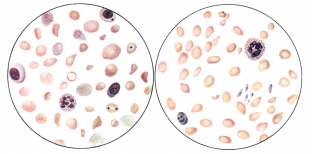In modern times, the incidence of anemia in humans has increased significantly. There are many reasons for this, which consist in a change in nutrition, a violation of the structure and functions of the organs of the digestive tract, and genetic features. Effective treatment of any pathological process must begin with an understanding of the causes and mechanism of the development of the process. Thus, the treatment of B12-deficiency anemia is based on the elimination of its causes. What are the reasons and mechanism development of B12-deficiency anemia?
Role of the Castle factor in the development of B12-deficiency anemia
B12 deficiency anemia is also called pernicious or megaloblastic anemia. Anemia develops with a lack of vitamin B12 and / or folic acid, to which the bone marrow and tissues of the nervous system most react. In the pathogenesis of the development of B12-deficient anemia, there are several mechanisms that depend on the cause. Consider the mechanism of development of anemia in cyanocobalamin deficiency.
Glycomucoprotein is synthesized in the stomach, which is called the intrinsic factor of Castle. It consists of peptides, pepsinogen and mucoids (secretion of the gastric mucosa). The Castle factor, when vitamin B12 is ingested with food, binds to it, forming a complex that is absorbed in the ilium. Therefore, vitamin B 12 is also called the external factor of Castle.
What causes B12 deficiency anemia?
Lesions of the gastrointestinal tract, in particular the stomach, such as gastric cancer and gastritis, lead to disruption of the synthesis of intrinsic factor Castle. Thus, vitamin B12 can be ingested but not absorbed. Also often such a pathology is observed after resection of the stomach. In most cases, the patient is unaware of the presence of inflammatory diseases in the gastrointestinal tract and the development of B12 deficiency anemia. Therefore, identifying the symptoms of vitamin B12 deficiency and stomach pathologies is a difficult and important task for a doctor.
Vitamin B12 deficiency can be caused by:
- Minimum dietary intake of vitamin B12, vegetarianism.
- Low absorption of the complex in the small intestine due to enteritis, Crohn's disease, celiac disease.
- Damage of the epithelium of the gastric mucosa by chemicals.
- Infiltrative processes in the stomach (lymphoma, carcinoma).
- Increased intake of vitamin B12 by bacteria when they are abundant.
- Worm infestations.
- Presence of antibodies to gastromucoprotein or to the gastromucoprotein+vitamin B12 complex.

Biochemical mechanism of development of B12-deficiency anemia
Vitamin B 12 (cyanocobalamin), together with folic acid, takes part in a wide range of metabolic processes and body reactions. Vitamin B12 is a cofactor in the methyltransferase catalytic reaction, the purpose of which is to resynthesize methionine and regenerate 5-methyltetrahydrofolate into tetrahydrofolate and 5,10 methylenetetrahydrofolate.
If there is not enough folate and/or cyanocobalamin, this leads to disruption of the incorporation of the substance uridine into the DNA of developing hematopoietic cells and the synthesis of thymidine. This causes DNA fragmentation by blocking synthesis and disrupting cell division. After such disorders, megaloblastosis appears, large forms of leukocytes and platelets accumulate, which are destroyed early in the bone marrow. Thus, the life cycle of cells in the blood is significantly shortened, and hematopoiesis turns out to be ineffective, B12-deficient anemia develops, which, together with thrombocytopenia and leukopenia, is easy to detect in a general blood test.
When and why does funicular myelosis develop in B12-deficient anemia?
In addition, cyanocobalamin plays the role of a coenzyme in the conversion of methylmalonyl-CoA to succinyl-CoA. This reaction is necessary for the synthesis and metabolism of myelin in the tissues of the nervous system. Therefore, with a deficiency of vitamin B 12, in addition to anemia, demyelination of nerve fibers develops with the onset of funicular myelosis. And with a deficiency of only folic acid, only megaloblastic anemia develops.
Cyanocobalamin is found in animal products, so vegetarians often suffer from this form of anemia. A large amount of vitamin B12 in eggs, milk, liver and kidneys. Vitamin reserves in the body are 5 mg. The daily loss of the vitamin is approximately 5 mcg. Thus, if we assume that there is no supply of vitamin B12, then the supply will last for 1000 days. That is, in the presence of B12 – deficiency anemia, symptoms begin to appear after almost 3 years. Vegetarians are advised to consume milk regularly to prevent the development of B12 deficiency anemia.







Add a comment